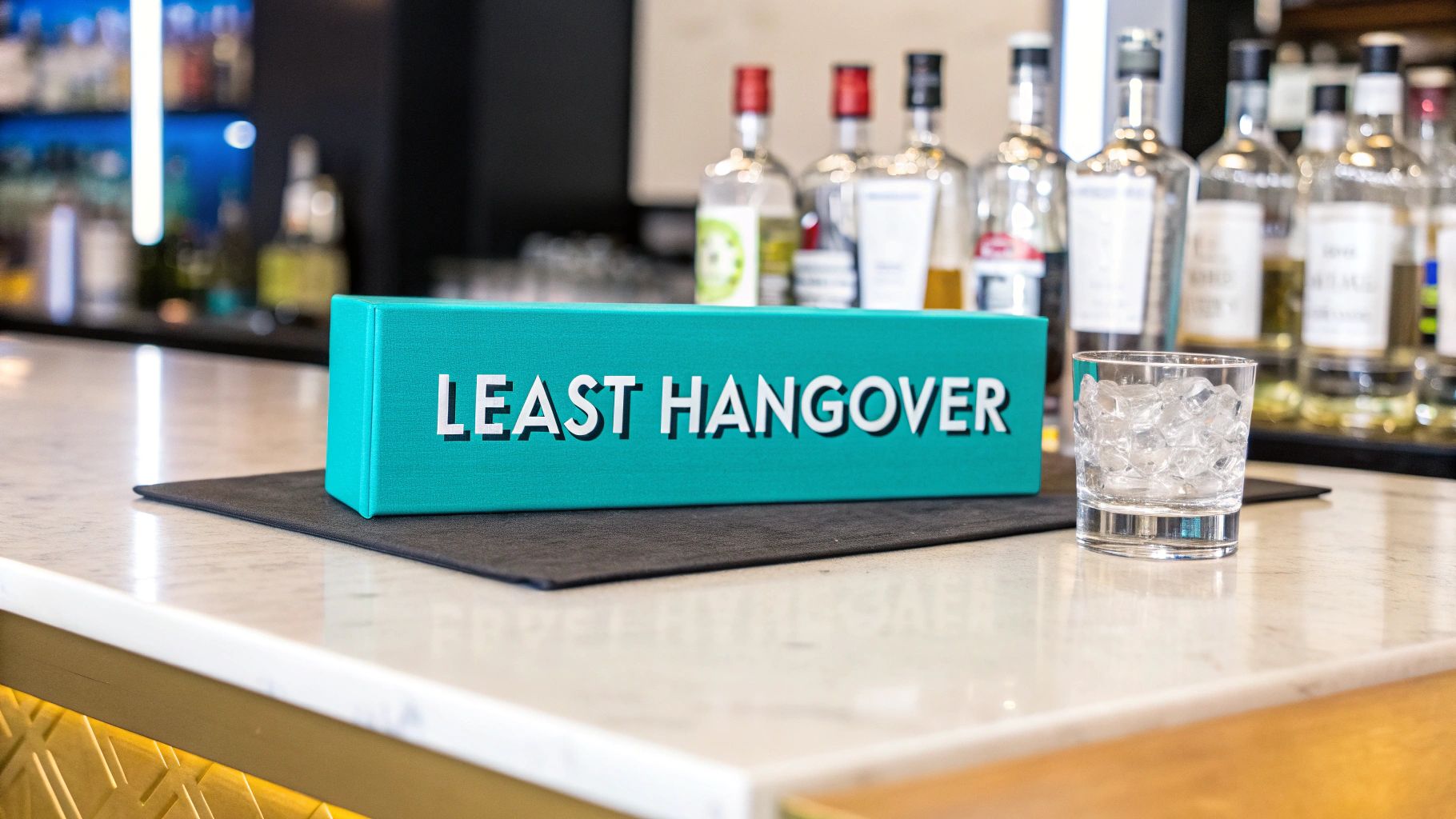

· By Annemarie
What Alcohol Causes the Least Hangover
If you’ve ever found yourself wondering what alcohol will give you the least painful hangover, the answer is actually pretty straightforward. Clear, highly distilled spirits like vodka and gin are your safest bet. Why? Because they have the fewest of those nasty, hangover-causing compounds. Stick with them, and you're far less likely to regret your night out compared to downing darker liquors or red wine.
The Science Behind a Better Morning After
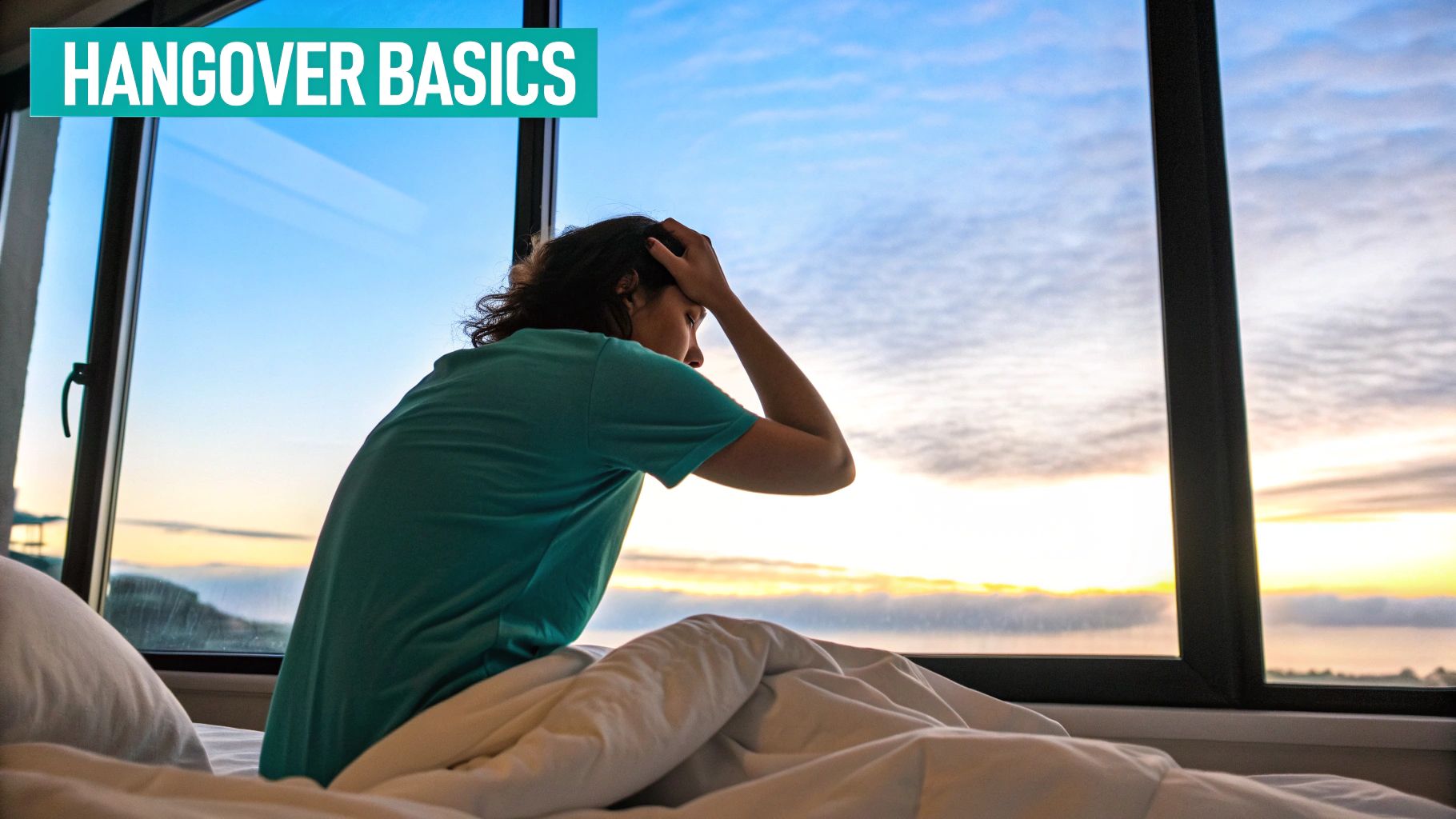
Ever notice how a couple of glasses of red wine can leave you feeling a hundred times worse than a few vodka sodas? There's a reason for that, and it comes down to a group of chemical byproducts called congeners. These little compounds are created during the fermentation and aging process.
Congeners are what give many drinks their signature flavor, smell, and color. That deep, oaky character in a good bourbon or the rich complexity in a bold red wine? That's all thanks to congeners. While they definitely make the drink more interesting, they also put a serious strain on your body.
How Congeners Supercharge Your Hangover
Think of your body processing alcohol as a simple task. When you drink something with a lot of congeners, it's like asking your body to do that same task but in a loud, distracting room. Your system has to work overtime to break down not just the ethanol, but a whole bunch of other compounds, too. We’re talking about things like:
- Methanol: A common congener that your body converts into formaldehyde—a seriously toxic substance that plays a huge role in hangover symptoms.
- Tannins: Found in red wine, these are famous for triggering headaches in people who are sensitive to them.
- Fusel oils: These complex alcohols can slow down your metabolism and make the next-day misery that much more intense.
The more congeners you drink, the harder your body has to work, and the worse you’re probably going to feel.
Research backs this up, showing that darker liquors are the biggest offenders. Bourbon, for instance, can have up to 37 times more congeners than vodka. This lines up perfectly with more frequent and severe hangovers.
This is exactly why knowing https://enjoyupside.com/blogs/news/what-causes-hangovers is the first step to avoiding them. By sticking with drinks that have fewer of these troublemakers, you give your body a much better shot at waking up feeling human again.
Ranking Alcohols From Safest Bet to Biggest Regret
Ever wonder why a few whiskeys leave you feeling like you wrestled a bear, while a couple of vodkas feel like a breeze? The secret isn’t just about how much you drink, but what you drink. When it comes to hangovers, the simple rule of thumb is: the clearer, the better.
Highly distilled, light-colored spirits are your best friends for a better morning. They have the lowest amount of those nasty compounds called congeners, making them the smartest choice if you’ve got plans the next day.
Vodka is the undisputed champion here. It's almost pure ethanol and water, which means it has the fewest congeners of any common spirit. Gin is a close second, with just a few more congeners from the botanicals that give it that distinct flavor.
Navigating Wines and Beers
Moving down the list, we get to light beers and crisp white wines like Sauvignon Blanc or Pinot Grigio. These are pretty middle-of-the-road. They have a moderate amount of congeners, so they’re generally a safer bet than their darker, moodier cousins.
The real trouble starts with red wines and dark beers. They’re packed with more congeners—including tannins in wine—that are notorious for contributing to those skull-crushing headaches and next-day fatigue.
To see just how big the difference is, check out this comparison of popular spirits.
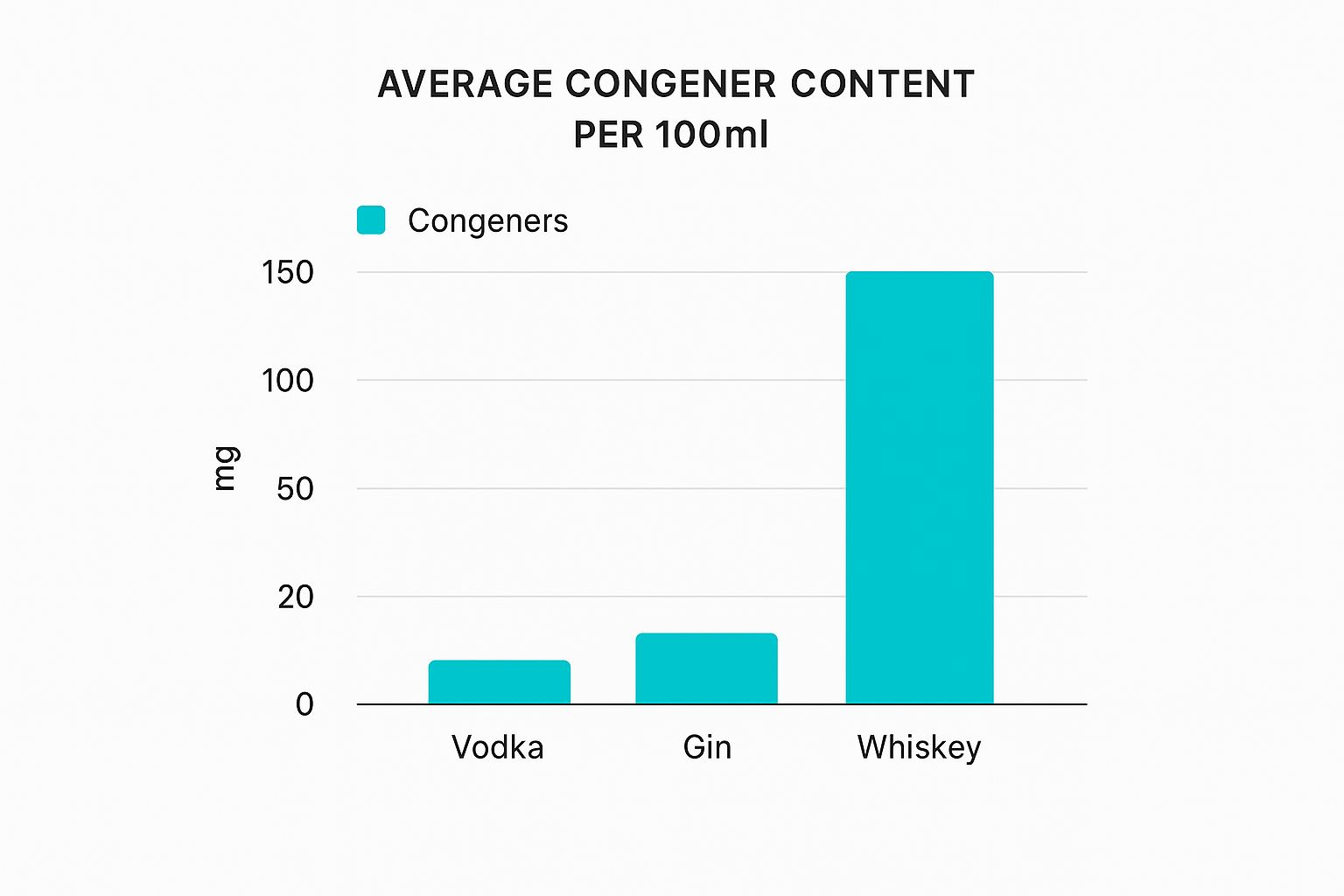
As you can see, whiskey’s congener content is in a completely different league than vodka or gin. Now you know why it has such a legendary reputation for brutal hangovers.
Hangover Risk by Alcohol Type
To make it even simpler, here's a quick cheat sheet ranking common drinks from your safest bet to your biggest regret, based on their typical congener levels.
| Hangover Risk Level | Alcohol Type | Key Congeners |
|---|---|---|
| Lowest | Vodka, Gin | Minimal to none |
| Low to Medium | Light Beer, White Wine | Low levels of various congeners |
| Medium to High | Dark Beer, Red Wine | Higher levels, including tannins |
| Highest | Whiskey, Bourbon, Dark Rum, Brandy | Acetaldehyde, acetone, tannins, esters |
Basically, the darker and more complex the drink, the more likely it is to make you pay for it the next morning.
The Biggest Hangover Culprits
At the very bottom of our list, we have the darkest, most flavorful liquors. These are the ones most likely to have you promising "never again."
- Whiskey, Bourbon, and Dark Rum: These spirits get their beautiful colors and rich flavors from aging in wooden barrels. Unfortunately, that same process loads them up with congeners.
- Brandy: Often considered the absolute worst offender, brandy is famous for producing particularly vicious hangovers. It's absolutely packed with congeners.
By sticking to low-congener drinks, you’re actively reducing the toxic load on your body. This simple switch is one of the easiest ways to wake up feeling fresh and ready to take on your day.
Of course, even with the smartest choices, a little planning goes a long way. You can get more great tips in our guide to the top drinks to avoid a hangover. And for some extra insurance, keeping a remedy like Upside Hangover Jelly on hand can help give your body the boost it needs to process everything more efficiently.
Why Darker Drinks Lead to Darker Mornings
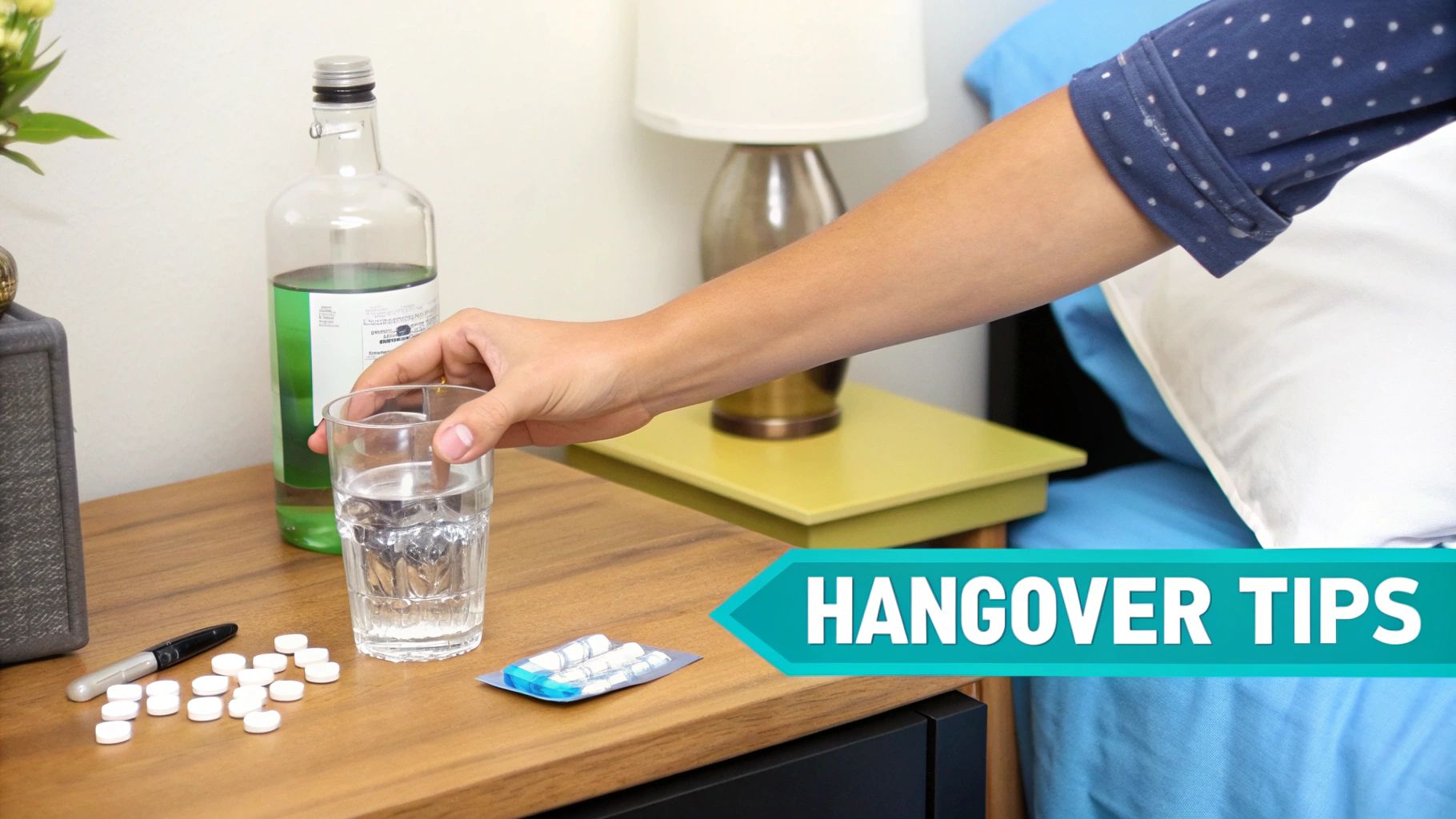
You’ve probably heard the debate a thousand times, maybe even had it yourself: bourbon or vodka? While they can both be the life of the party, one of them is way more likely to make you regret it the next morning. And no, it’s not just in your head—it all comes down to the chemistry of what you're sipping.
Dark liquors like bourbon, whiskey, and aged rum get that deep color and complex flavor from spending time in charred oak barrels. This aging process creates chemical compounds called congeners, and guess what? They’re the main culprits behind a truly brutal hangover.
Basically, the very things that give a dark spirit its signature taste are what your body has to fight off later. You're not just processing alcohol; you're dealing with all these extra compounds, which can lead to more inflammation, a pounding headache, and that all-too-familiar feeling of misery.
The Science of the Showdown
If you need hard proof, just look at the research. One study went straight for the classic matchup, giving people either bourbon or vodka until they reached the same blood alcohol level. The results were crystal clear.
Even when they were equally intoxicated, the folks who drank bourbon reported significantly worse hangovers than the vodka group. This backs up what we’ve known for a while: the high congener content in bourbon is the real troublemaker. You can dig into the full study about hangover severity from different liquors for yourself.
It’s pretty obvious—if you're looking for an alcohol that causes the least hangover, staying away from dark, barrel-aged spirits is step number one.
So, when you choose a clear spirit like vodka, you are effectively selecting a "cleaner" drink with fewer impurities for your body to process. This simple choice can be the difference between waking up refreshed and waking up with regret.
Of course, no alcohol is totally hangover-proof. But knowing this key difference helps you make smarter choices. And for those nights you do go for the good stuff, having a recovery sidekick like Upside Hangover Jelly gives your body the backup it needs to bounce back faster.
The Hidden Culprits in Your Glass of Wine
Ever wonder why a couple of glasses of wine can leave you feeling way worse than a few cocktails? It feels backward, but it's true. The unique chemistry of wine, especially red wine, is packed with a few extra troublemakers that go way beyond the usual suspects.
We're talking about tannins, sulfites, and histamines. If you've ever felt that dry, puckering sensation from a bold red, that's tannins at work. For some people, they're a one-way ticket to a splitting headache. Then there are histamines, which can trigger allergy-like symptoms—think flushing, a stuffy nose, and, you guessed it, more headaches.
That Pesky Sulfite Myth
Sulfites get a really bad rap for hangovers, but honestly, it's mostly a misunderstanding. Yes, a small slice of the population has a genuine sensitivity to them, but for the average person, they aren't the big bad wolf behind your wine hangover. The real problem is the tag-team effect of alcohol hitting your system along with all these other potent compounds.
It's not just a feeling, either. A big survey actually found that wine drinkers reported the worst hangovers compared to people who drank beer, cider, or spirits. It just goes to show that what's in your drink really matters. You can get into the nitty-gritty of how different drinks affect hangovers here.
When you mix congeners, tannins, and histamines all together, you've got the perfect storm for a miserable morning after. This is exactly why that "relaxing" bottle of red might be the very reason you're now googling which alcohol causes the least hangover.
Practical Strategies for a Hangover-Free Experience
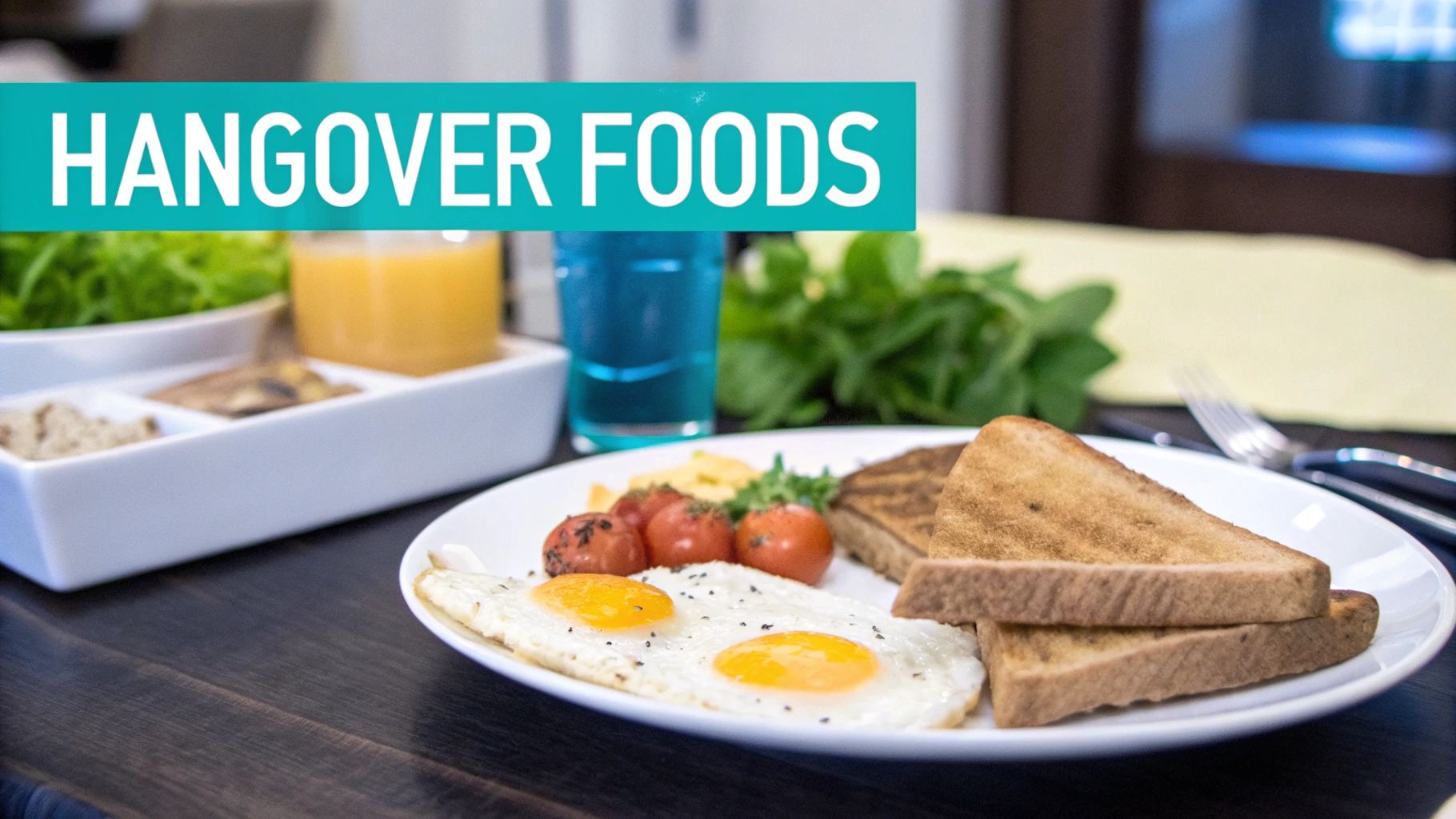
Choosing an alcohol that's kinder on your body is a great first move, but it’s only half the battle. How you drink throughout the night is just as crucial for how you'll feel the next morning. A few smart habits can make a world of difference, no matter what’s in your glass.
The absolute golden rule? Hydration. Alcohol is a diuretic, which is just a fancy way of saying it makes you pee more. This leads straight to dehydration, which is the main culprit behind those killer hangover headaches and next-day fatigue. An easy fix is to make it a personal policy: one full glass of water for every alcoholic drink. No exceptions.
Set Yourself Up for Success
Before you even think about that first sip, make sure you've had a solid meal. Hitting the booze on an empty stomach is like fast-tracking it straight into your bloodstream. A meal loaded with protein, fat, and carbs slows that process way down, giving your body a fighting chance to keep up.
Pacing yourself is another game-changer. Your liver can only handle about one standard drink per hour, and pushing it faster is a recipe for disaster.
Here are a few more pro tips to keep in your back pocket:
- Ditch the Sugary Mixers: That sugar rush from sodas and juices will eventually crash, leaving you feeling even more tired and weak. Stick to mixers like soda water or a squeeze of fresh citrus.
- Skip the "Hair of the Dog": We’ve all heard it, but drinking more the next morning just puts off the inevitable. You’re just prolonging the pain.
- Get Some Real Sleep: Alcohol messes with your sleep cycle. Aim for a full night of quality rest to let your body properly recover and reset.
Think of it this way: when you combine smarter drink choices with these proactive habits, you’re building a powerful defense against hangovers. It's all about working with your body, not against it.
Want to dive even deeper? Check out our full guide on how to prevent a hangover before your next big night. Turning this knowledge into a real plan is the secret to a much, much better morning after.
Hangover FAQs
Even if you go in with the best intentions, a few questions always seem to pop up during a night out. Here are the quick and dirty answers to the most common hangover mysteries, so you can make smarter choices and finally figure out which drinks won't ruin your tomorrow.
Does Mixing Different Alcohols Make Hangovers Worse?
Not really, at least not directly. That old saying, "grape or grain but never the twain," doesn't have much science to back it up. The real problem with mixing is that it's just plain hard to keep track of how much you're actually drinking, which usually means you end up drinking more overall.
When you mix, you're also getting a cocktail of different congeners from various spirits, and that can definitely make your symptoms feel worse. The trick isn't avoiding variety—it's about keeping an eye on your total alcohol intake.
Is More Expensive Liquor Better for Hangovers?
A lot of the time, yes—especially when it comes to clear spirits. Top-shelf vodkas and gins go through intense distillation and filtration, a process designed specifically to strip out impurities and those nasty congeners. You’re left with a "cleaner" spirit that’s way less likely to leave you with a monster hangover.
Now, for darker liquors like whiskey or rum, it’s a bit of a different story. The congeners are often what give them their signature flavor, so they're left in on purpose. Still, the general rule holds: a high-quality clear spirit is almost always your safest bet for feeling better the next day.
The bottom line? The type of alcohol you choose (think clear vs. dark) is a much better clue to how you'll feel than the price tag alone.
Do Sugary Drinks and Mixers Worsen Hangovers?
Oh, absolutely. Pounding mixers packed with sugar—like regular soda, juice, or tonic water—sends your blood sugar on a wild rollercoaster. First it spikes, then it comes crashing down, hard. That crash just makes the fatigue, weakness, and headache of a hangover feel ten times worse.
Plus, let's be honest, sugary drinks are fantastic at hiding the taste of alcohol, making it dangerously easy to have one too many without even realizing it. If you want to minimize the damage, stick with low-sugar mixers.
Your best bets are simple:
- Soda water
- A fresh squeeze of lime or lemon
- Diet tonic water
Making these simple swaps can make a surprisingly huge difference in how you feel when you wake up.
Ready to make hangovers a thing of the past? Upside has your back with a convenient, effective, and great-tasting solution. Grab your Upside Hangover Jelly and enjoy your night without worrying about tomorrow.
